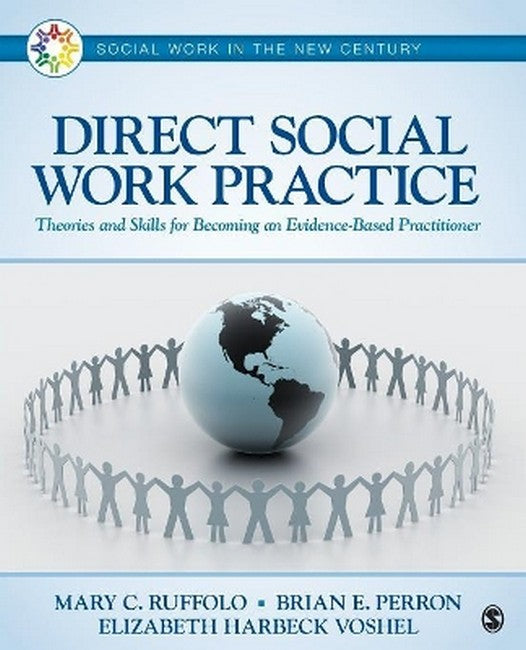Mary C. Ruffolo, PhD, LMSW, is a professor with the University of Michigan's School of Social Work. She teaches classes on topics related to assessment and interventions with children, adolescents, adults, families and small groups. Dr. Ruffolo's research emphasizes the development, evaluation, and sustainability of evidence-based or evidence-informed practices in public behavioral health settings, as well as in integrated health environments. Brian E. Perron, PhD, is an associate professor with the University of Michigan's School of Social Work. He teaches classes on topics related to diagnosis and treatment of mental health and substance use disorders. Dr. Perron is also actively involved in research related to these topics, with an emphasis on clinical assessment, measurement, evidence-based practices, and predictive modeling. Elizabeth H. Voshel, LMSW, ACSW, is an associate clinical professor and director of field instruction with the University of Michigan's School of Social Work. She has been a leader in the school's integrative learning effort and teaches a capstone seminar. Voshel has presented nationally and internationally on field instruction curriculum and social work ethics and was employed for 22 years by the US Department of Veterans Affairs.
Request Academic Copy
Please copy the ISBN for submitting review copy form
Description
Chapter 1: An Overview of the Book What Is Generalist Social Work Practice? Major Themes in Each Chapter How This Book Is Organized Suggestions for the Social Work Student Suggestions to the Social Work Instructor Chapter 2: Integrative Themes That Guide Social Work Practice with Individuals, Families, and Small Groups Definition of Social Work Profession and Principles of the Profession The Mission of Social Work Social Justice Lens Core Theoretical Perspectives Integrating Conceptual Perspectives Chapter 3: From Evidence-Based Practice to Evidence-Informed Practice Defining Evidence-Based Practice (EBP) The Challenges in Using the EBP framework in Social Work Chapter 4: Professional Values, Ethics, and Professional Use of Self Professional Social Work Values, Purpose, and Practice Principles NASW Code of Ethics Standards Ethical Decision Making A Closer Look at Self-determination, Informed Consent and Confidentiality, Privileged Communication, and Technology/Social Media Use Addressing Malpractice and Unethical Behavior Chapter 5: Engagement and Relationship-Building Skills Core Values That Guide Engagement and Relationship-Building Efforts in Social Work Practice Pathways to Services Approaches That Positively Impact the Engagement Phase Skill Building That Emphasizes Collaboration to Improve Follow-Through The Stages of Change Framework Alliance Building Chapter 6: Assessment in Social Work With Individuals and Families Defining Assessment The Bio-Psycho-Social-Spiritual History Key Screening Tools Trauma Assessments and Mandated Reporting Responsibilities Diagnostic and Statistical Manual of Mental Disorders (DSM-5), Cultural Assessment Tools in the DSM-5, and International Statistical Classification of Diseases and Related Health Problems (ICD-10) Chapter 7: Change Planning What Is Change Planning? Core Principles of Change Planning Change Goals Goal Selection Goal Specification: A SMART Approach Intervention Selection The Written Change Plan Chapter 8: Core Intervention Skills: Using Cognitive and Behavioral Approaches in Social Work Practice With Individuals, Families, and Groups The Cognitive Aspect of CBT Cognitive Restructuring Behavioral Aspects of CBT ABC from a Behavioral Standpoint CBT as an Integrative Framework Practice of CBT Structural Features of CBT Ongoing Professional Development Chapter 9: Intervention Skills: Using Problem-Solving, Psychoeducational, and Multisystemic Intervention Approaches and Case/Care Management Skills in Working With Individuals and Families Problem-Solving Approach Psychoeducational Approach The Substance Abuse and Mental Health Service Administration (SAMHSA) Evidence-Based Toolkit Online Psychoeducational Modules Multiple-Family Psychoeducation Program (MF-PEP) Multisystem Intervention Approaches Case/Care Management Approaches Chapter 10: Additional Skills for Working With Families and Groups Introducing the Core Skills Needed When Working With Families and Helping Families to Change Social Work's Mission in Working With Families A Multidimensional Ecosystemic Comparative Approach (MECAmaps) to Assess Cultural and Contextual Sociopolitical Contexts Establishing a Relationship With Each Family Member Models of Family Work Special Note: Working With Couples Introducing the Core Skills Needed When Working With Groups Leading Groups and Understanding Group Development Stages Chapter 11: Outcome Monitoring Overview of Outcome Monitoring Is Outcome Monitoring Research? General Principles of Outcome Monitoring Measurement Types and Data Collection Summarizing Data and Making Inferences Common Measurement Questions Chapter 12: Lifelong Learning and Professional Development Over the Life Course Your Professional Identity Supervision and Mentorship Remaining Current With the Research Licensure Continuing Education Professional Social Networks

